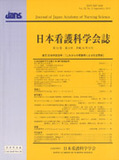Japanese
English
- 販売していません
- Abstract 文献概要
- 参考文献 Reference
- サイト内被引用 Cited by
要旨
目的:地域高齢者の保健行動に関連する自己制御力を評価する尺度を開発した.
方法:12の保健行動について,行動aと目標bからなる24項目の自己制御尺度を作成し,地域高齢者1,883名を対象に質問紙調査を実施した.さらに,地域高齢者38名に対し,歯磨き行動を維持するプログラムに1ヵ月間参加することを求め,介入前とその1.5ヵ月後に尺度を用いて調査した.
結果:質問紙調査の分析対象は803名,平均年齢75.7±6.3歳,男性が42.0%であった.度数分布に偏りがあった2項目を削除し,22項目を因子分析した結果5因子が抽出された.自己制御力の強さは保健行動ごとに「目標b/(4-行動a)+1」から求める自己制御得点の合計で示した.合計得点とHealth Locus of Control尺度,改良型セルフ・コントロール尺度との相関は,各々r=0.24,0.27であった(p<0.05).尺度全体のα係数は0.83であった.プログラムを実施した27名は,実施しなかった11名より有意に自己制御得点の合計得点が高かった(p<0.05).再テスト法による合計得点の相関係数はr=0.577であった.
結論:自己制御尺度は,信頼性が確保され,構成概念妥当性及び基準関連妥当性が確認された.
Abstract
Purpose: The purpose of this study was to develop a self-control ability assessment scale associated with health behavior (SCAAS) for older adults in a community.
Methods: The SCAAS contained 24 items, namely, present behavior (a) and future goal (b) for each of 12 health behaviors. A questionnaire survey about the SCAAS was conducted among 1,883 older adults. Then thirty-eight older adults were asked to participate in a program to maintain oral health for a month. The questionnaire survey about the SCAAS was conducted before the program start and after one and a half months.
Results: 1. Eight-hundred and three responses to the SCAAS were analyzed. The subjects had an average age of 75.7±6.3 years, and 42.0% were men. 2. Twenty-two items were selected for the SCAAS from the results of frequency distribution, mean and factor analysis. Five factors were obtained by exploratory factor analysis. The degree of self-control ability was determined as the sum of 11 health behavior scores calculated using a formula; b/(4-a)+1. The sum of the scores significantly correlated with the total scores of the health locus of control scale (r=0.24) and the reformative self-control scale (r=0.27). Cronbach's α was 0.83 for overall scores. 3. The sum of the scores of 27 older adults that had practiced the program were significantly higher than those of the 11 elderly that had not practiced. The test-retest correlation was 0.577 overall scores.
Conclusion: These results suggest that the developed SCAAS has construct validity, criterion-related validity and reliability.
Copyright © 2012, Japan Academy of Nursing Science. All rights reserved.


